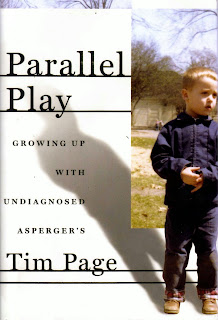I've always been attracted to intelligent people, or rather, geniuses. As far back as I can recall, I've been drawn to original thinkers, doers, and especially, the "quiet" type. But, I never thought to classify those rare individuals with any so-called disorder. Tim Page, who won a Pulitzer Prize as chief music critic for The Washington Post, was diagnosed at the age of forty-five with Asperger's Syndrome—an autistic disorder characterized by often superior intellectual abilities (such as all encompassing recall and computer-like retention) but also by obsessive behavior, ineffective communication, and social awkwardness. In his memoir, Parallel Play, Page reveals how the diagnosis helped him make sense of the loneliness and uncomfortable personality that marked him for life.
The chronicle of Tim Page's journey with Asperger's is fascinating, as it opens a window to a world that few understand. It is a condition which some consider a disability, but I would argue, a gift. It is speculated that Albert Einstein and Isaac Newton may have had Asperger's as both experienced intense intellectual interests in specific areas. Both scientists had trouble reacting properly in social situations and had difficulty communicating. The syndrome was identified in 1944, by Hans Asperger, a Viennese pediatrician who wrote, "For success in science or art, a dash of autism is essential."
In "Parallel Play," Page recounts his earliest memories as a child simultaneously young and old who sought refuge in music and books, a rebellious teen-ager easily prone to over-stimulation and morbid thoughts. The course of Tim Page's life shifted dramatically while attending a summer at Tanglewood. "Suddenly I had peers who (and sometimes shared) my obsessions, with whom I could discuss pieces I was learning on the piano, the compositions I was trying to write, obscure recordings, the proper way to dot a sixteenth note, and the dream of what Glenn Gould called the purpose of art—a gradual , lifelong construction of a state of wonder and serenity."
Tim Page concedes that many of the things he's accomplished were not despite his Asperger's syndrome but because of it. His book has provided me with greater insight and sensitivity for those isolated and afflicted by genius. And I take the opening quote of the book (attributed to Philo of Alexandria) to heart:
Be kind, for everyone you meet is fighting a great battle.
Words that a music critic should heed.
Sunday, September 19, 2010
Subscribe to:
Post Comments (Atom)


No comments:
Post a Comment